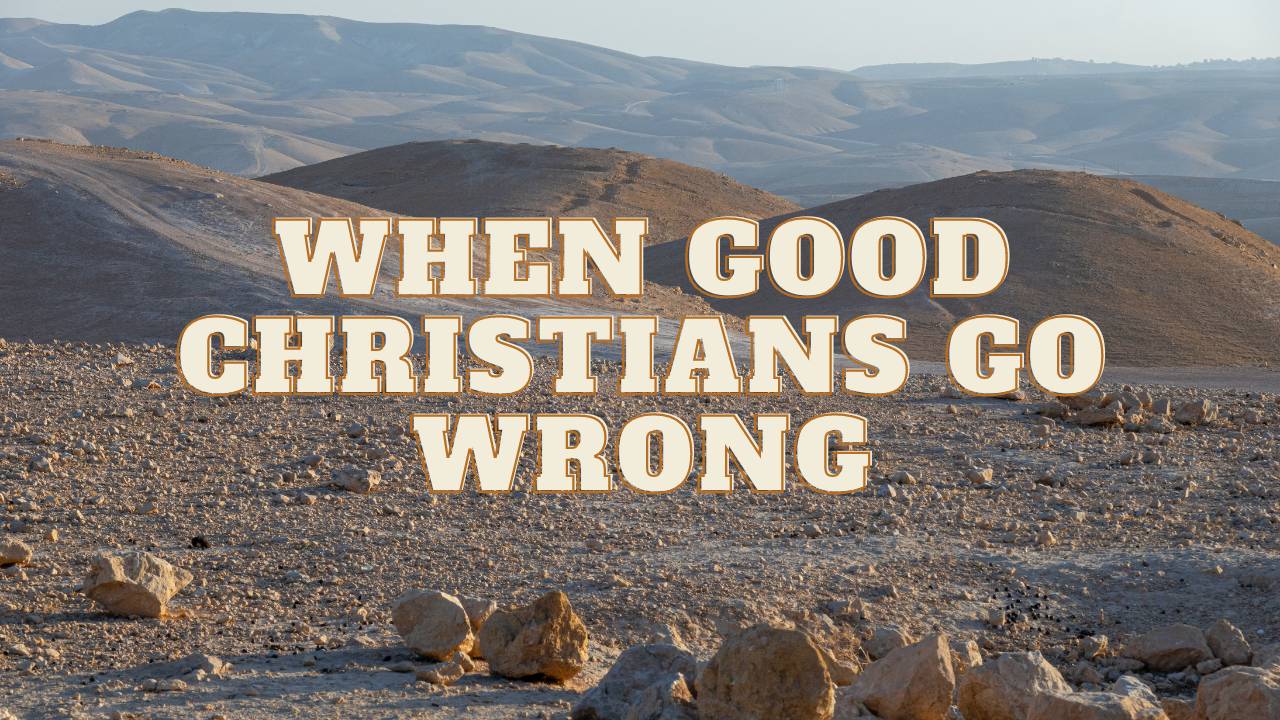When Good Christians Go Wrong

One of the challenges for many Christians today is how to reconcile the numerous bad examples of Christian leaders. Thankfully, I believe there are far more good examples than bad, but there are enough bad ones to make this a significant issue. Notable names include Ravi Zacharias, Bill Hybels, James MacDonald, Pete Wilson, Perry Noble, and Bruxy Cavey. And those are merely the famous ones.
Even more perplexing is how many Christian leaders can apparently act in ways contrary to the person of Jesus and yet also avoid any accountability for it. In fact, it’s an issue that many people who follow Jesus find hard to make sense of when it comes to how we view the institutional church. In case you’re wondering, I’m not alluding to a particular former president as I think he merely used the appearance of Christianity to get what he wanted. I’m talking primarily about church leaders like Mark Driscoll or John MacArthur who continue to lead in the spotlight today after a laundry list of offenses pile up behind them. Driscoll even had an entire viral podcast documenting his abuses (see: The Rise and Fall of Mars Hill).
If you think I'm exaggerating, I'd encourage you to follow people like Julie Roys (see: JulieRoys.com) or groups like the New Evangelicals (see: TheNewEvangelicals.com) who work courageously to tell the stories of the church that often get swept aside. And in both of these examples, they do it from "within" as fellow Christians.
This leads us to a question. How do we make sense of good Christians gone wrong?
A couple of options bubble to the top.
- We might want to conclude that they were never really Christian. This is likely the easiest option that allows you to dismiss it all.
- Or perhaps they were Christian at one point but somehow aren’t really Christian anymore. This takes a bit more explaining but still allows you to dismiss it.
But I think both of those options fail to appreciate what’s really going on.
Consider a day in the life of Moses as a point of reference. In case you aren't as familiar with the Old Testament, Moses is a pretty big deal. He emerges as one of the great leaders in the story of Israel. It was said that "There has never been another prophet in Israel like Moses, whom the Lord knew face to face" (Deuteronomy 34:10).
The book of Exodus tells us about one particularly impressive leadership moment.
Then Moses cried out to the Lord, “What should I do with these people? They are ready to stone me!” The Lord said to Moses, “Walk out in front of the people. Take your staff, the one you used when you struck the water of the Nile, and call some of the elders of Israel to join you. I will stand before you on the rock at Mount Sinai. Strike the rock, and water will come gushing out. Then the people will be able to drink.” So Moses struck the rock as he was told, and water gushed out as the elders looked on. Moses named the place Massah (which means “test”) and Meribah (which means “arguing”) because the people of Israel argued with Moses and tested the Lord by saying, “Is the Lord here with us or not?” (Exodus 17:4-7).
Can you fathom how awesome that would be? Imagine the amount of leadership clout Moses gained that day by being able to supernaturally tap into the power of God with his staff. Easy sailing from that point on. Except the people get thirsty again. So God decides to bring another miracle, but this time God has a twist.
...and the Lord said to Moses, “You and Aaron must take the staff and assemble the entire community. As the people watch, speak to the rock over there, and it will pour out its water. You will provide enough water from the rock to satisfy the whole community and their livestock.” (Numbers 20:7-8a).
Notice the difference? Take the staff... but don't use it. Instead, use your words. No big deal right? Except this would have been a massive deal for Moses. As we learn elsewhere
But Moses pleaded with the Lord, “O Lord, I’m not very good with words. I never have been, and I’m not now, even though you have spoken to me. I get tongue-tied, and my words get tangled.” (Exodus 4:10).
God invites Moses to trust God in an area of Moses' weakness. Moses isn't good with words, at least by his own admission. This isn't just a test for God's people. It's a test for God's chosen leader. What happens next is disappointing.
Then he and Aaron summoned the people to come and gather at the rock. “Listen, you rebels!” he shouted. “Must we bring you water from this rock?” Then Moses raised his hand and struck the rock twice with the staff, and water gushed out. So the entire community and their livestock drank their fill. (Numbers 20:10-11).
He struck the rock twice.
Why? Because it didn't work the first time (like it did the last time). I feel like this was the grace of God giving Moses a chance to reconsider. I can't help but wonder what would have happened if Moses had spoken to the rock at that point before hitting it a second time. Interestingly, Jewish tradition records that the rock seeped blood first before the second blow when it released water. Either way, the text makes it clear it didn't work until he strikes it a second time.
Here’s the lie we often believe in these situations: If something appears to have the power of God it must therefore also have the endorsement of God. But Moses shows us it can be more complicated than that.
Moses used the power of God to disobey God. And it worked!
Could it be possible that there are Christian leaders today doing the same thing? Could there be pastors and elders and Christian leaders with significant influence using their relationship with God for purposes that are actually contrary to God's desires? And doing it in ways that still produce results? It sure seems like it to me. As bizarre as it may sound, this should be a very encouraging thought for us.
God doesn’t abandon Moses, but Moses doesn’t get to experience the Promised Land because of this one moment with the rock. "But the Lord said to Moses and Aaron, 'Because you did not trust me enough to demonstrate my holiness to the people of Israel, you will not lead them into the land I am giving them!'" (Numbers 20:12). That had to come as quite the shock to Moses. Even though Moses got water out of the rock, God wasn’t on board with it. And it would cost Moses far more than he bargained for.
If you are disillusioned by Christianity or the church today, take heart. If the story of Moses teaches us anything, it's that some of what is ‘working’ is likely not of God. In addition, God provides for God's people despite the failure of God's leader. They all got water. I think God will continue to be present in both the healthy and unhealthy forms of the church today as we all struggle forward. God's goodness is not hampered by our sinfulness.
In an aside I find particularly touching, "The Lord buried [Moses] in a valley near Beth-peor in Moab, but to this day no one knows the exact place" (Deuteronomy 34:6). No one knows where Moses' body is buried because no human buried it. God did that personally.
Let this be a reminder to all of us that the point of Christianity is to experience Jesus and look more like Him. Moses' job that day was to trust God, not to make water come out of a rock through his own leadership talents. Our influence on others depends on the same types of situations. Our goal is not to win or produce any particular result. It is to trust God, even when God invites us to lead in our areas of weakness.
Don't strike the rock twice.
Photo by Dmitry Mishin on Unsplash
Sign up with your email and never miss a post!
We hate SPAM. We will never sell your information, for any reason.





